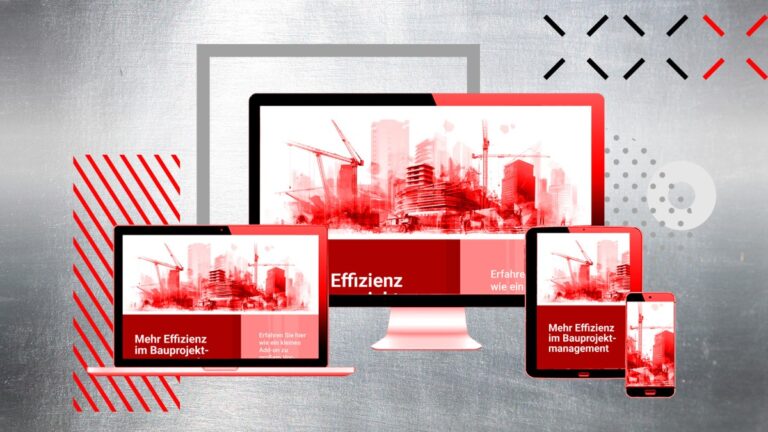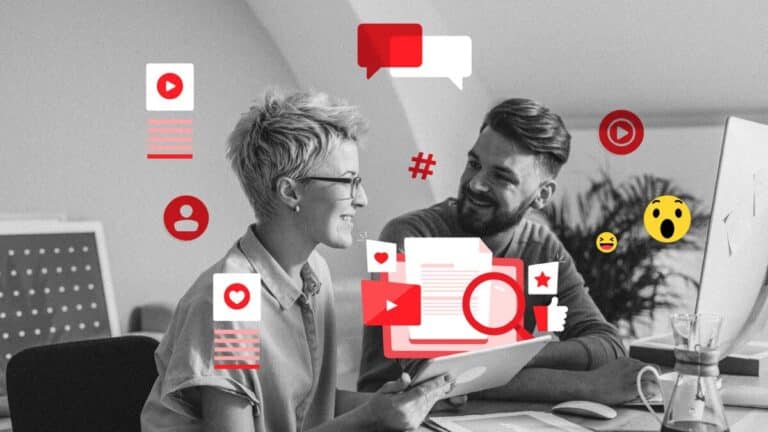Your company has a reputation among your employees, whether you have consciously created it or not. Establishing an employer brand that you and your employees can be proud of should be a priority for any company, large or small, to stand out from your competitors.
What is employer branding in B2B?
Your employer brand is essentially the way your company is perceived by others, especially your current employees. A big part of your reputation is the marketing of your products or services, but it also depends on the internal situation of the company. Because without a strong team, you can't market anything either.
Why is employer branding important in B2B?
According to Glassdoor research. 86 percent of job seekers Company ratingsto decide whether or not to apply for a job. So if you have a lot of dissatisfied reviews from employees, most potential applicants will reject your vacancy.
Research by LinkedIn have shown that more than 75 percent of job seekers Find out about a company's reputation and employer brand before applying. Companies with a questionable reputation not only have difficulties in attracting applicants, but also in retaining employees.
Therefore, it is important to optimise your employer brand by investing time and resources in building a reputation that attracts new employees. This is invaluable, especially in times of skills shortages. Here are the six key benefits of a strong employer brand.
What are the biggest advantages of employer branding in B2B?
Let's take a look at the statistics that illustrate the benefits of a strong employer branding strategy as well as the ROI of investing in employer branding activities.
More highly qualified applicants
There is a lot of research that shows that companies with a strong employer brand attract more talent to their organisations.
Here are just a few of them:
- 9 out of 10 applicants:inside would apply for a job if it came from an employer brand that is actively cultivated.
- In terms of deciding where to apply, 84 per cent of job seekers say that a company's reputation as an employer is important.
- 80 per cent of talent acquisition managers believe that employer brands have a significant impact on the ability to hire great talent.
- LinkedIn also found that companies with a strong employer brand see 50 per cent more qualified applicants.
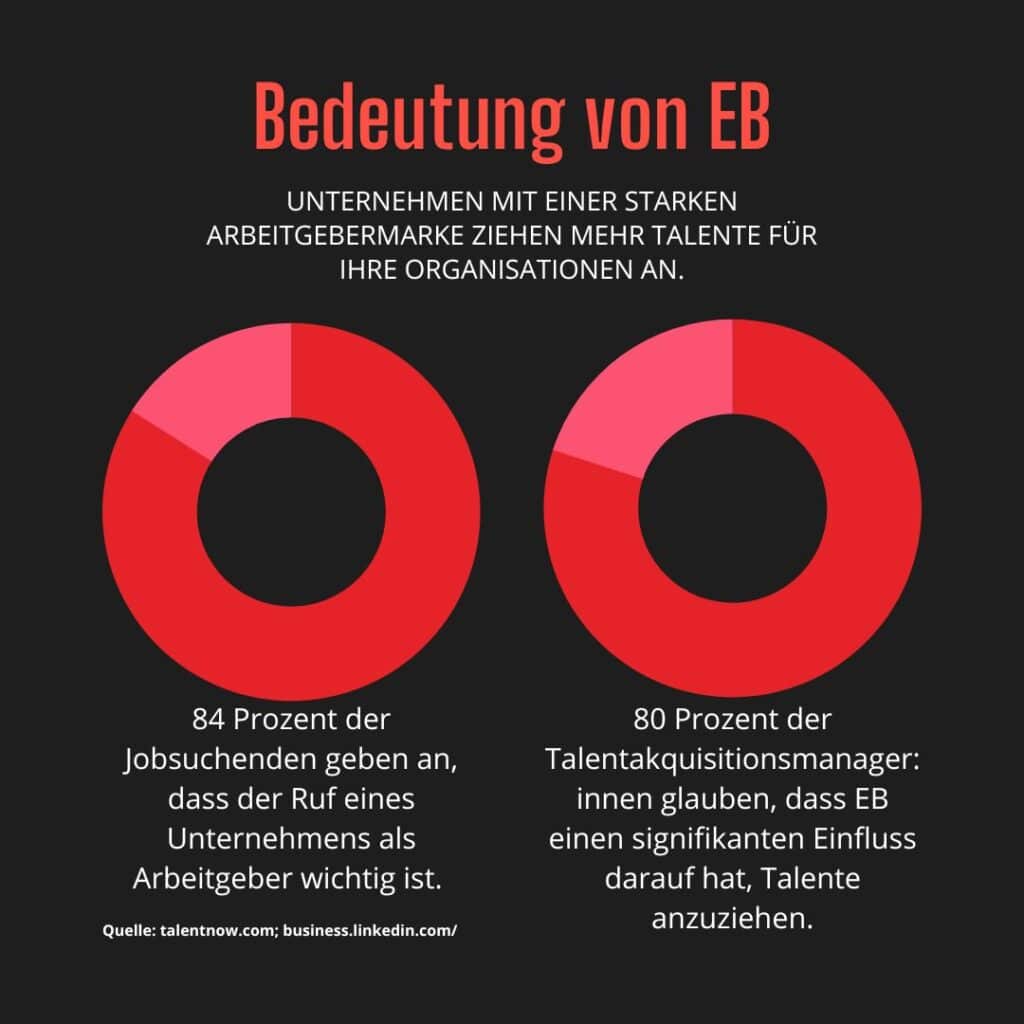
Lower fluctuation rates
As mentioned earlier, organisations that invest in different employer brand strategies are better at attracting talent that fits their core values, mission and vision. As a result, employee:internal turnover in these organisations can be reduced by 28 percent be reduced.
Lower expenditure
Because strong employer brands attract more job seekers, companies that invest in their reputation also have lower hiring expenses.
Furthermore, a negative reputation costs companies at least 10 per cent more per setting.
Loyal customers
Employer brand and candidate experience can have a significant impact on customer acquisition and retention.
Candidates who have had a bad experience during the selection process tend to stop consuming the company's products and services. According to CareerArc 64 per cent of consumers have stopped buying a brand after learning about poor treatment of that company's employees.
Faster growth
People are a company's most important asset. Since employers with a strong reputation are more likely to hire top talent, they also experience faster growth.
According to LinkedIn research, companies on LinkedIn with a strong Talent Brand Index (TBI) grew 20 % faster than their peers with a weaker talent brand.
Diversity and inclusion
Companies that can point to a clear employer branding strategy are better at attracting diverse talent and improving their Strengthen diversity and inclusion initiatives.
Employer branding channels such as (B2B) Social Media offer employers a great opportunity to showcase their corporate and social responsibility and build more diverse workplaces.
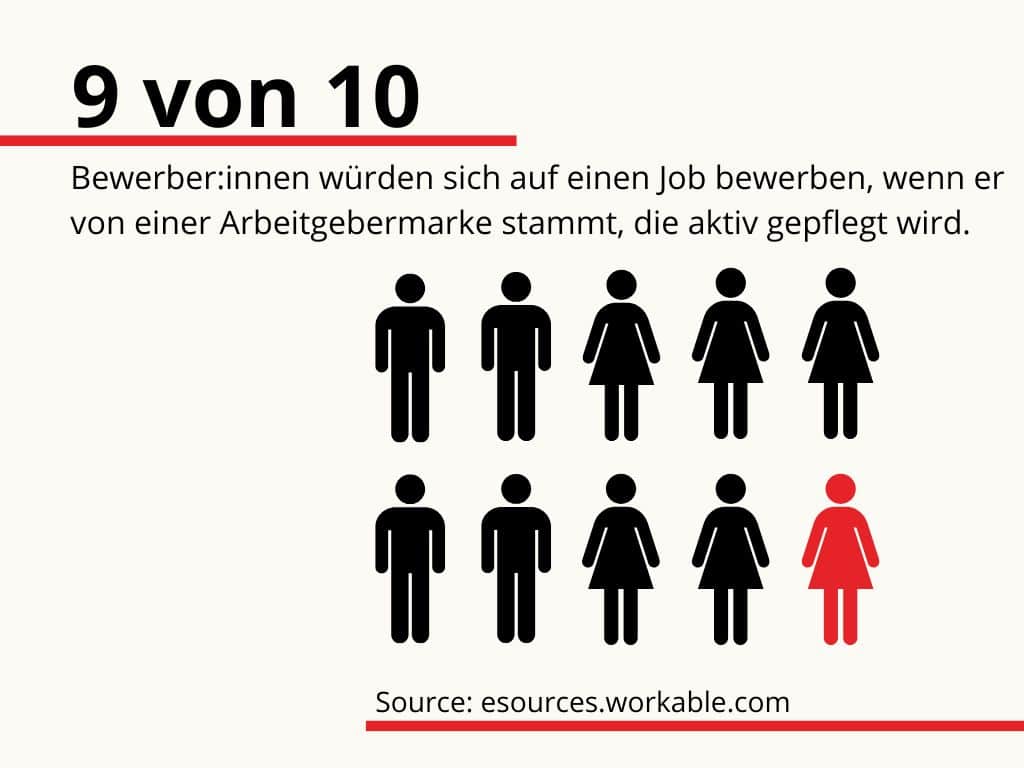
How is employer branding done in B2B?
Many employers confuse employer branding in B2B with recruitment marketing. Employer branding in B2B is a part of recruitment marketing - a relatively new concept in the world of recruiting that uses marketing tactics for successful talent acquisition. Employers can use B2B employer branding in many different ways and through different channels.
Some social media platforms, such as Instagram, are mainly used to attract talent. In addition, many companies have optimised their career pages to communicate their employee value proposition and employer brand in a way that is inviting to applicants.
Employer branding in B2B can also be done through inbound recruiting methods, where employers create useful, relevant and interesting content to drive candidate interaction and enhance their experience.
All of these employer branding tactics have a major impact on a company's brand, reputation and, consequently, its ability to recruit the best people.
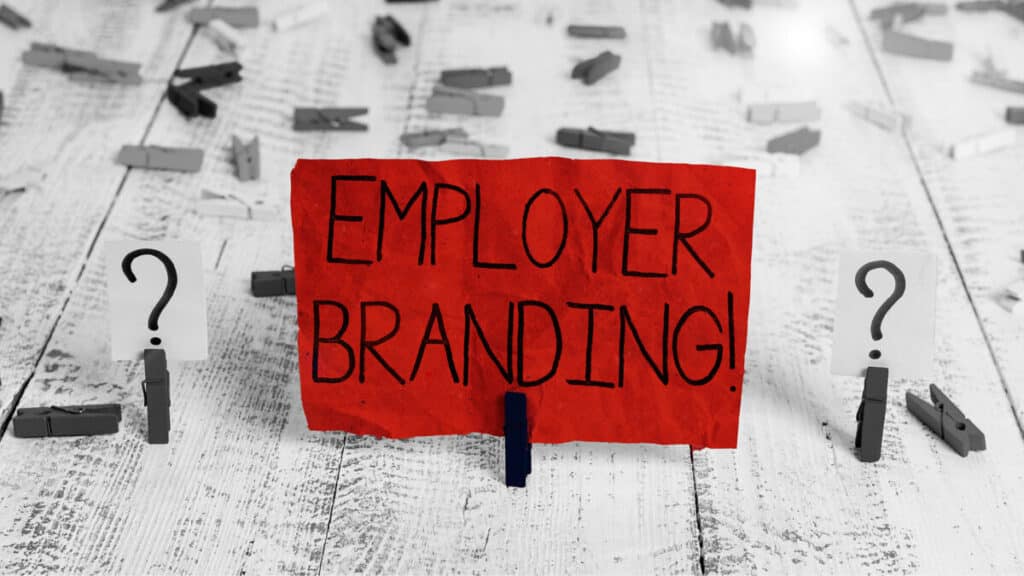
Create a successful employer branding campaign
Planning, building, implementing and managing a successful employer branding strategy is no easy task. Moreover, with the increase of different employer brand channels, many organisations now have dedicated EB teams.
There are no quick employer brand wins. Instead, the employer brand is something that a company needs to manage on an ongoing basis.
Let's now take a look at the must-follow steps for building the most successful employer brand strategy.
Define your EVP
The Employee Value Proposition (EVP) is what your organisation stands for. It is the representation of your company's core values, mission, vision and culture. It differentiates you from your competition and ultimately attracts talent to your organisation.
But only 61 percent of companies have well-developed EVPs, and 44 percent of all CEOs do not even know that their company uses EVPs.
When defining the EVP, it is important to remain realistic. Many organisations tend to make their value propositions sound very attractive to talent, while the reality is not so rosy. As a consequence, they have low employee retention and high turnover rates.
This is why the saying "employer branding starts from within" is so popular. If you want to attract new talent to the company, positioning yourself as a better place to work is a prerequisite.
Understand the individual challenges and future needs in Talent Acquisition
When developing an employer branding strategy, it is important to understand the current challenges in recruitment and hiring. In addition, current and future recruitment needs must be understood in order to get the most out of employer branding activities.
For example, if it is clear that attracting AI talent is the biggest challenge, it is only logical that AE efforts are directed towards this talent.
Define goals
In order to create an employer branding strategy and measure the impact of it, setting clear goals is crucial.
Some of the most common destinations for AE are:
- Increase the number of high-quality applicants
- Increase the traffic on the career site
- Increase interaction on EB-related social media posts
- Reduce time and cost per hire
- Increasing employee engagement in employer branding activities
- Increase the number of job referrals
- Improving the candidate experience
- Improvement of the offer acceptance rate
- Reduction of the application dropout rate
- Increase employer:inside ratings on relevant platforms such as Kununu
Define candidate personas
To make employer branding campaigns more personal and effective, it is essential to define and understand your candidate personas. A candidate persona is the visual representation of your perfect candidate.
To define candidate personas, it is best to start from your own employees and answer questions like:
Which generation do they belong to? What is important to them when it comes to their career? Salary, growth and development, company culture, interesting projects, job flexibility, working environment or something else? Where do they look for job opportunities? What kind of content about employers:inside do they find valuable? Do they spend time on social media? Are they active or passive job seekers?
Once you have answers to these questions, it is much easier to define what kind of AE content should be created and through which channels this content is best promoted.

Optimise your employer branding channels
There are different channels that companies use to promote their employer brand and reach their target candidates.
According to LinkedIn, most organisations plan to extend their employer brand through three channels: the corporate website (69 per cent), online networks for professionals (61 per cent) and social media (47 per cent). It is therefore crucial that organisations define and optimise their employer branding channels that are used by their target candidates to research potential employers.

Engage your employees
The most effective employer branding activities are those that showcase your existing employees. According to LinkedIn, companies whose employees share their brand's social content see an increase in the views their job offers receive.
Engaging employees in your AE campaigns is crucial as they have great power to increase trust in the workplace. If you can encourage employees to share their own stories and become your employer brand ambassadors, your external communications will look much more credible and attractive to job seekers.
Here are some examples of employee-generated content that is valued by applicants:
- "A day in my company" - the stories around the kind of work the employees do and the working environment show.
- Stories in the sense of "Why I applied and why I stay", which explain why employees have chosen this company and are satisfied with it.
- Stories about "how working in my company is different", describing how working in your company is different from the way they used to work.
These stories can be shared on social media, stories, live sessions, career pages, YouTube videos, local media publishers, events and many other channels.
Human resources, HR and talent management departments are usually responsible for developing employer branding strategies. They often also work with marketing and communications teams to ensure consistent communication among employees and customers.
However, it is important for organisations to understand that their employees are the most important employer brand ambassadors. According to Edelman Trust Barometer the voices of employees are perceived as 3 times more credible than those of CEOs when it comes to working conditions in a company.
Furthermore, employees are the most trusted and influential source of corporate news and information, ahead of the company's CEOs, customers and media spokespeople.
Ensure a positive applicant:inside experience
Employer branding in B2B does not end once a candidate has applied. The candidate experience in the selection process is also an important part of employer branding.
According to Talent Adore 78 per cent of applicants say that the overall experience they have during the application process is an indicator of how much a company values its employees. And those with a poor experience never apply for jobs with that organisation again.
Moreover, many of them stop using products and services of this organisation and even advise their friends to do the same.
Measure success and optimise based on findings
Measuring the impact of your AE activities is important to improve them in the future and achieve the highest possible ROIs. To measure the success of your employer branding campaigns and activities, you should refer to the defined objectives and carry out a before and after analysis.
Although 96 per cent of companies believe that employer brand and reputation can have a positive or negative impact on turnover, less than half (44 per cent) monitor this impact.
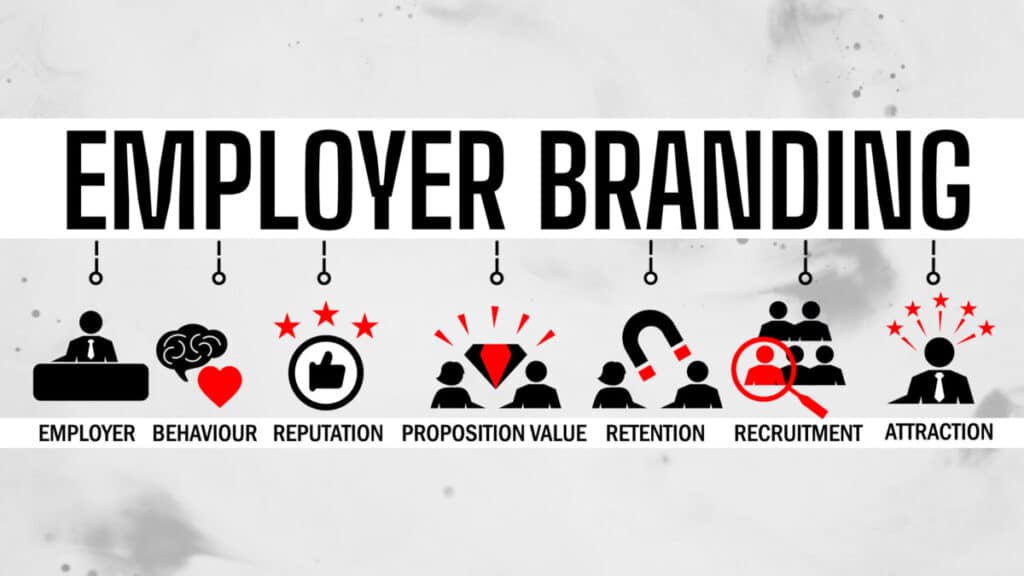
Conclusion
In the current market environment, with increasing competition for top talent, building a credible employer brand and positioning yourself as a great place to work is a crucial factor for small and medium-sized enterprises. A strong brand This influences whether qualified candidates decide to join your team - or accept an offer from the competition instead.
For a growing small to medium sized business, attracting and hiring the best talent is critical to scaling the business and ensuring its future success. The impact of an employer brand is real: a strong talent brand directly influences the overall success of the company, which goes hand in hand with building an all-star team.
If your small to medium-sized company wants to build a strong employer brand, our B2IMPACT team can help! Contact us without obligation and make yourself more attractive than ever as an employer!




